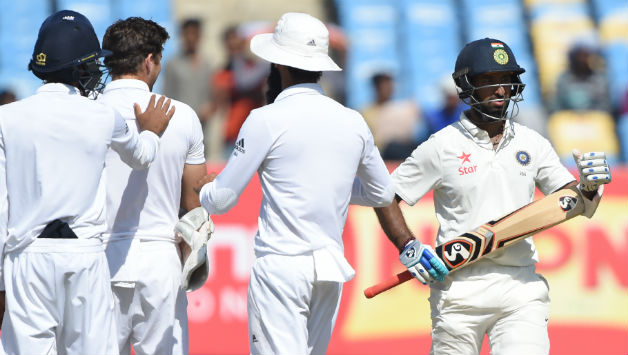
Cricket Country Staff
Editorial team of CricketCountry.
Written by Cricket Country Staff
Published: Nov 11, 2016, 02:21 PM (IST)
Edited: Nov 11, 2016, 02:32 PM (IST)


In the ongoing first Test between India and England at Saurashtra Cricket Association (SCA) Stadium, Rajkot, the Decision Review System (DRS) made its debut in India. Before this series, there were lot of debates and discussions over using DRS in India but after coach Anil Kumble and captain Virat Kohli gave a thumbs up to it, the Board of Control for Cricket in India (BCCI) finally agreed to use it in this series. There was no use of DRS from Indian side in both first and second day of the Test and infact, England used it twice and both time it did not come in their favour and went India’s way as the umpire decision stayed because the batsman was genuinely out. Full Cricket Scorecard: India vs England 1st Test at Rajkot.
India did not take any review on first and second day and it is probably because they were not friendly to this technology but on the third day, they finally used it after Indian batsman Cheteshwar Pujara was given out for lbw appeal by Zafar Ansari. The crowd at Rajkot went silent when the decision was being reviewed and also because it is the home ground for Pujara. Before going for the review, Pujara had a little chat with his partner Murali Vijay, who denied him to take it as the ball went straight towards his pad but while it was being reviewed, it came to know that the delivery was going above the stumps and there was a huge roar in the stands as he was not given out. His father and wife were seen rejoicing in the stands, as shown in the video shared by BCCI’s official Twitter handle:
Mr. Pujara’s DRS call delights Mrs. Pujara @cheteshwar1 #INDvENG pic.twitter.com/sW8oIYF450
— BCCI (@BCCI) November 11, 2016
TRENDING NOW
Meanwhile, Pujara and Vijay have taken India to a strong position in the match with their unbeaten partnership.
This website uses cookies so that we can provide you with the best user experience possible. Cookie information is stored in your browser and performs functions such as recognising you when you return to our website and helping our team to understand which sections of the website you find most interesting and useful.
Strictly Necessary Cookie should be enabled at all times so that we can save your preferences for cookie settings.
If you disable this cookie, we will not be able to save your preferences. This means that every time you visit this website you will need to enable or disable cookies again.
